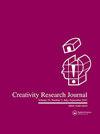Brain Connectivity-Based Prediction of Combining Remote Semantic Associates for Creative Thinking
IF 3.1
3区 心理学
Q2 PSYCHOLOGY, EDUCATIONAL
引用次数: 1
Abstract
ABSTRACT Associative thinking plays a major role in creativity, as it involves the ability to link distant concepts. Yet, the neural mechanisms allowing to combine distant associates in creative thinking tasks remain poorly understood. We investigated the whole-brain functional connectivity patterns related to combining remote associations for creative thinking. Using a connectome predictive modeling approach, we examined whole-brain functional connectivity patterns related to connecting close and distant remote associates in the Combination Association Task (CAT). Brain connectivity networks predicting CAT performance showed contributions from brain functional connectivity mostly related to the Default Mode Network, likely related to associative processes required in all trials of the task. Besides, the functional connectivity pattern of associative remoteness linked to CAT trials also largely involved the Executive Control Network, Dorsal Attention Network and Somatomotor networks, suggesting that more controlled processes played an important role in trials with higher associative remoteness. Critically, the functional connectivity patterns related to higher creative demands of the task share similarities with functional connectivity patterns previously found to predict divergent thinking. Thus, our work potentially offers insights into neural mechanisms that play a role in both convergent and divergent remote thinking.基于脑连通性的创造性思维远端语义联想组合预测
联想思维在创造力中起着重要作用,因为它涉及到连接遥远概念的能力。然而,在创造性思维任务中,允许远距离伙伴结合的神经机制仍然知之甚少。我们研究了与结合远程联想进行创造性思维相关的全脑功能连接模式。使用连接组预测建模方法,我们在组合联想任务(CAT)中检查了与连接近距离和远距离联想相关的全脑功能连接模式。预测CAT性能的大脑连接网络显示,大脑功能连接的贡献主要与默认模式网络有关,可能与任务的所有试验中所需的联想过程有关。此外,与CAT试验相关的联想远程功能连接模式也主要涉及执行控制网络、背侧注意力网络和躯体运动网络,这表明更多的受控过程在具有更高联想远程的试验中发挥了重要作用。至关重要的是,与任务的更高创造性需求相关的功能连接模式与之前发现的预测发散思维的功能连接方式有相似之处。因此,我们的工作有可能深入了解在趋同和发散远程思维中发挥作用的神经机制。
本文章由计算机程序翻译,如有差异,请以英文原文为准。
求助全文
约1分钟内获得全文
求助全文
来源期刊

Creativity Research Journal
Multiple-
CiteScore
5.10
自引率
7.70%
发文量
52
期刊介绍:
Creativity Research Journal publishes high-quality, scholarly research capturing the full range of approaches to the study of creativity--behavioral, clinical, cognitive, crosscultural, developmental, educational, genetic, organizational, psychoanalytic, psychometrics, and social. Interdisciplinary research is also published, as is research within specific domains (e.g., art, science) and research on critical issues (e.g., aesthetics, genius, imagery, imagination, incubation, insight, intuition, metaphor, play, problem finding and solving). Integrative literature reviews and theoretical pieces that appreciate empirical work are extremely welcome, but purely speculative articles are not published. Readers are encouraged to send commentaries, comments, and evaluative book reviews.
 求助内容:
求助内容: 应助结果提醒方式:
应助结果提醒方式:


